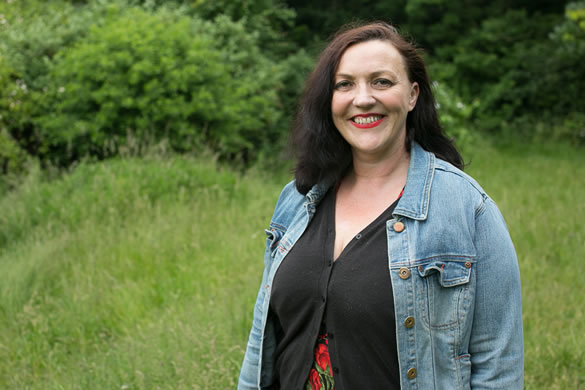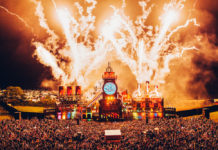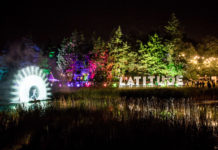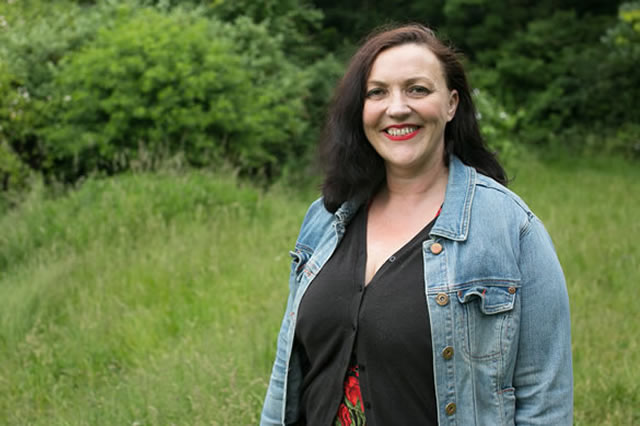
The Green Man is one of Wales’ leading independent festivals. If you like your parties with a dash of hippy philosophy, modern comfort and stylish convenience, then you might want to consider making this event a strong contender for your party calendar space this Summer. Located in a naturally beautiful Black Mountains enclave, Fiona Stewart and her family pack a wild and varied blend of arts, culture and music into a four day spectacular that’s renowned for its friendly vibes. How can we say this with such surety? Well, they’ve won two UK Festival Awards outright in 2010 and 2012. On this basis we decided that we simply had to meet up with Fiona to discover some of the secrets of her success.
Looking for the latest on Green Man Festival? View our guide here »
Just so we can get a feel for the Green Man festival, can you tell us what you do that no other festivals do?
Green Man is the biggest music event in Wales. It is the only commercial festival of its size that’s owned and run by women. It’s got a 24 hour drinks license, which is the only one in the UK. We have lots of Mercury award winners here and a unique musical line-up.
How difficult was it to get a 24 hour drinks license?
We got a very good reference when we started up the festival, due to my work at the Big Chill in Dorset. Every-time I did an event in those days, it was difficult to get licenses. I managed to build up a history of non-incidents with the police, so when I started up the Green Man festival the authorities were very supportive. They scrutinized our operation for the first year, which was really quite tough on us, then when we were able to deliver it to a standard that they felt was good, they were really cool about it. If we let our standards drop, then they’d quite rightly say that we’d have to have police on site.
So how did you manage to keep the Green Man and the Big Chill completely incident free, as alcohol is notorious for creating incidents?
No, the Big Chill wasn’t entirely incident free, there was always police on site. With the Green Man it’s really down to the people who go there, who are a gentle crowd, as we welcome families and those looking for fun. Of course we have security, as there can be situations, but we manage to deal with them without having to get the police involved. Personally, I think if festival promoters can’t look after their own event they shouldn’t get licenses anyway.
Let me rephrase my initial question a little, in your opinion, what’s the difference between the Green Man and the more corporate festivals that run in the UK?
I think that everything definitely has its place, but we offer something different. For a start, there’s no sponsorship of any kind at the Green Man. At many commercial festivals they will bring in acts who are incredibly popular, and the event is really just a venue where people can hear their music. At the Green Man we just book artists that we’re passionate about, this can be everything from people you’ve never heard of, through to bands and musicians who were great once, but are not so well loved at the moment. Lots of people buy tickets for Green Man without even knowing who the headliners are, because they know what kind of vibe and experience to expect. We’re trying to capture the ideas of individuals to create parts of our festival.
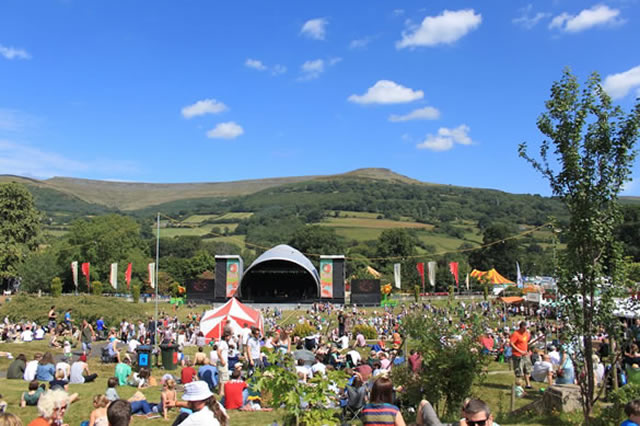
So do you have an ethos and a philosophy behind the Green Man? Each year do you have a picture of what you want to create, and then build it up like a mosaic or tapestry?
I don’t like anything that’s exclusive. I don’t want to push anyone away. No matter what you’re into or what you like I want you to find something at the Green Man. It’s about finding things that are sometimes challenging, sometimes interesting, things that engage with people whether it be comedy, or literature, or music, or science, or any of the other things. It’s all about finding that which is fresh and exciting, and that just kind of comes upon you. It’s my son who finds all the music – I’ve dragged him along to festivals for most of his life, and I work with a team who listen to anything that people want to bring to our attention.
So do you actually get a chance to enjoy your event or are you bogged down with your organisational role within the festival?
I think what I’m doing at the event is keeping my eye on exactly how things are working. I suppose I’m lucky to be working with very talented and creative people, and I like to see how everything unfolds. I see if our targets are being met, and when I say targets, I mean making sure that the vibe is maintained.
How do you target a vibe?
Well you’ve got to ensure there’s the right kind of experience. You want it to be a happy, carefree space. I want it to be original with people going away thinking “wow that’s something I’ve never seen anywhere else”. It’s those kind of things, you judge it from the outcome. I think lots of things are really over-produced, so we like to take a punt on new things, and sometimes that can be quite hard work – if someone’s got an idea they want to bring to us, we’re like go for it and we want to see it happen. Ultimately that’s what keeps it fresh each year – we’ve got new people bringing that input.
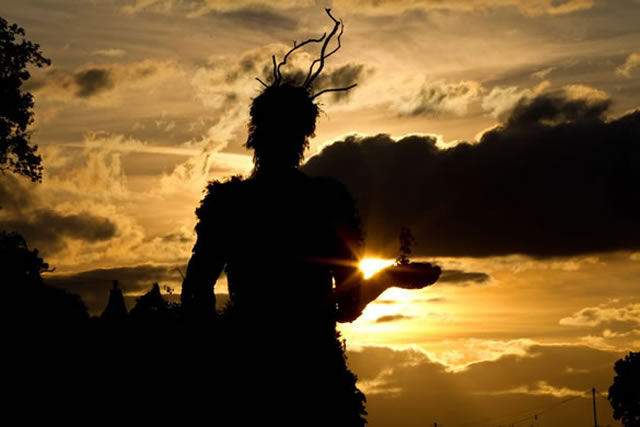
The Green Man is obviously a prominent symbol in the pagan community, do you have any links or do you draw any inspiration from the New Age movement?
We don’t burn any virgins, but the venue that we use is really beautiful and there’s been a there’s been people living in that space for at least a thousand years. Druids come to the festival each year and do a blessing and that’s for all festivals in the UK. We basically go down with them and drink a lot of cider. We thought that it was a nice thing to do – we’ve had a gathering every year and then we suddenly decided to bring the druids along. Rollo Maughling is the Arch-Druid from Glastonbury and the other guy is Uther Pendragon – he’s got the real sword Excalibur, and they have a few lady priestess and do this ceremony. We also burn a Green Man sculpture at the end of the festival.
There definitely is all that, but I think festivals are pretty Pagan anyway, they’re the most out there thing you can do in an outdoor area. I think that even though I came from the boutique style festival scene with the Big Chill, there has to be a balance between that and a good dose of feral to make the event memorable. I sometimes think that we’ve moved a bit far away from all that, and we need to bring it back to some kind of other-worldly space that has a fire in it. That’s definitely the type of event that I like to go to. It is an ancient image, and the Green Man plays into that – he’s the Lord of Misrule and he’s all of those things.
Festivals are about the recapturing of those ancient ideas. They provide us with the constructs of memory that keep driving us through our normal lives. Getting people away from an over-produced environment, where they’re just fed entertainment on TV, is what I’m really passionate about. In many ways The Green Man is an old fashioned festival. It’s the kind of event I used to go to when I was younger, with many of the things that I’d have liked to have had back then added – a little bit more comfortable and a better choice of food. We also provide places for kids – 12 and unders and a place for teens and we’ve got Einstein’s Garden, which is all about science and the environment. If you’re trying to engage people about changing their life-styles, do it so it’s fun, do it so it’s practical. You don’t want to try and scare people into doing it, or they’ll just sit in front of the TV and never do anything again. There’s an all night bonfire where you’ll find people having a kind of music nerd-off – you’ll hear a fun, but heated discussion, between a sixty year old and a twenty year old, talking about an artist that’s on the stage. There’s a lot of like minded people there who’re interested in the same stuff. There are always tribes at events, but it’s just not that tribal – there’s an openness about what’s going on, which translates to festival, making it just off the wall friendly.
What do you think are the biggest environmental costs of large festivals, and how do you make sure that your festival is as ecologically sound as possible?
I think the biggest cost is traffic actually. We do a number of things to offset the environmental costs of our festival as possible, such as putting on as much free transport as we can, making it as easy as possible for people to come to the event without using their own car. When it comes to travelling to the office we only have one vehicle. We thought we’d all go out and get a new hybrid or electric car, but when we actually looked into it we found that the greenest thing to do was actually just have this really ancient one forever and ever.
It’s those kinds of things – it’s not necessarily jumping to the next thing that comes through the door, it’s looking at it in a different way. The biggest thing we do is engaging our audience, getting them to think about different life-style choices, asking people to be a bit more aware and self managing, which makes a more significant difference than buying solar panels or jumping on the next new green bandwagon.
From a production point of view things are gradually changing – but it’s a minefield. To know what’s really green and what just sounds like its green is very difficult. It takes time to understand all those things. We’ve always been passionate about it. If I compare the Green Man to other, more mainstream festivals, at many of them you’ll see loads and loads of things that are left over at the end. At the Green Man there’s hardly anything left. This is down to our audience who are much more aware and make that effort. I’m quite positive about how people are changing their ways. It’s about encouraging people to look further than the ends of their noses, which many people are prepared to do.
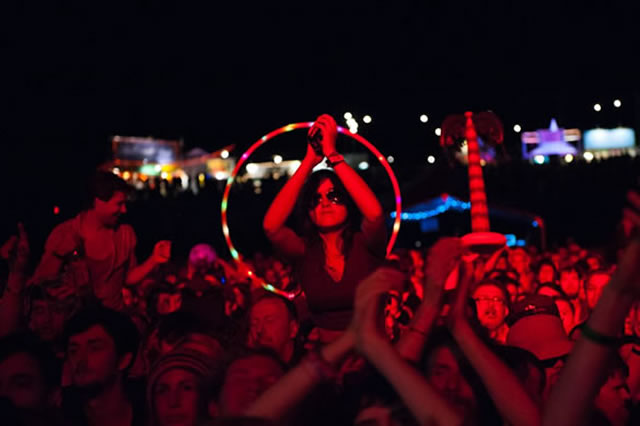
So how do you actually go about planning your event and where does the inspiration come from?
The inspiration comes very much from the moment. We always want to make it as nice, interesting, and cross-perspective as possible. We’re not very motivated by dosh, of course there is a business side to it,, but we’re carrying on whilst other events aren’t doing so well. We look at stuff, we research stuff and we know a lot of creatives who we think can do stuff with us. It’s very organic, you meet people, and you think about it and then you do it.
It’s not a driven thing – we’re lucky we don’t have any corporate backers who tell us to make a certain profit, or sell this many bottles of drink, and we don’t have a big sponsors who dictate what kind of acts they want associated with their brand. Thus all of the stuff you can find at Green Man – we like it, even down to the traders. We might taste something at another festival and think “ooh this is nice, do you want to come to our event?”. We’re not promoters who’ve decided in the last few years to do a festival. By doing everything ourselves with skills we’ve developed over the years, we keep our costs down. You get all these myths in the industry, like festivals will only break even after two years – well if you’re running a business you need to break even from day one. There’s a cruel wind of realisation blowing through this industry, because when people start off festivals they don’t realise how tough things can be.
The festivals that seem to have any kind of longevity seem to be those that are most niche. That has always been the way. It’s very, very easy to put on an event now, anyone can do it. That’s not the problem. We’ve had a renaissance of new events in this country, but many are the same, all vying for the same artists, and they only way around this is to retain creative individuality, and do something really different and be prepared to take a risk. It’s easy to look at things out there that are working, but to really succeed you’ve got to take a gamble. I would say it’s just as difficult to keep events up and running as it was back in the day, but in a different kind of way now. It’s so much more expensive to run the same event now as it used to be, the rising petrol costs and the rising artist costs, which are absolutely through the roof.
In your opinion what’s the biggest overall effect of big business on the festival scene?
I think there’s a lot of big business buying up smaller events. People are purchasing events that are going under. In some ways that’s a really good thing, in others, when it effects the development of art then, that’s a bad thing. I can’t really think of any other mass of negativity other than that. It’s down to how people behave at events. It’s got nothing to do with whether or not they’re funded with corporate money, it’s how you want to run your own business and the individuals involved with it.
Finally do you have any message to the fans of the Green Man festival?
Just thank you for coming all these years. After all it’s the people who really make the vibe at the Green Man which is a huge part of our success.
And thanks to the Lord of Misrule…
Yes… To the Lord of Misrule!
This is certainly one for the festival purists who’ll definitely find solace in the friendly vibe and awesome entertainment on offer from this event. We’re going to be down there, so keep your eyes peeled for our review, which as ever will give you our own, unique take on the proceedings.
Patti Smith, Kings Of Convenience, Ben Howard and Band of Horses headline Green Man Festival which takes place at Glanusk Park, Wales from Thursday 15th to Sunday 18th August 2013.
For more information and tickets view our guide to Green Man Festival.
